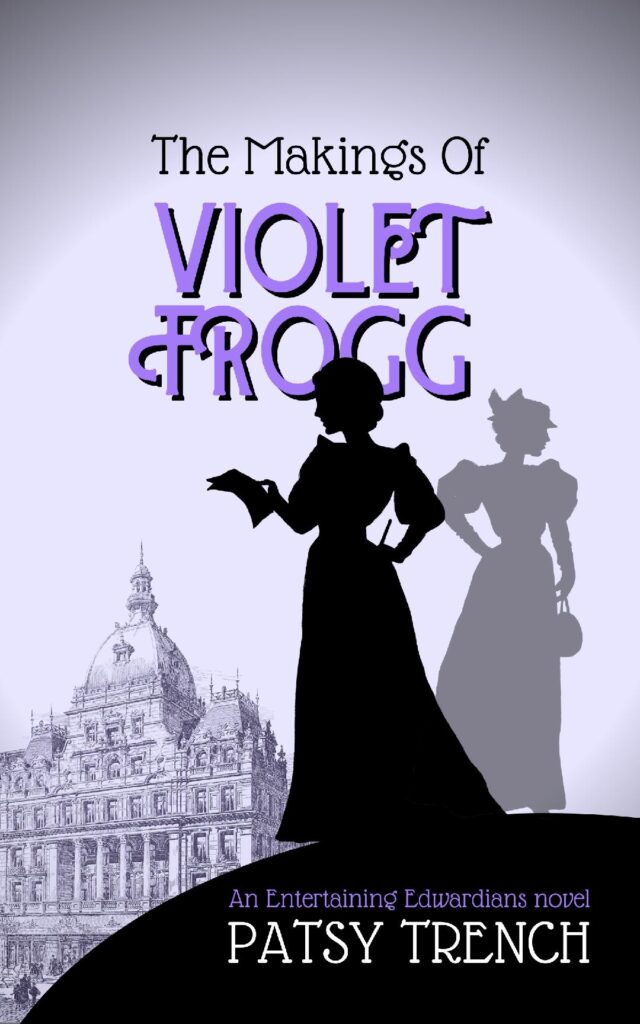
In ebook Kindle version on Amazon until 12 January 2022. Available HERE.
© Patsy Trench
In what she describes as a ‘Five Faves Geneameme’ Jill Ball of Geniaus, the Australian family history blog, has invited other family history bloggers to share details of five books they’ve found most useful in their ‘geneactivities’. (Enough puns already … )
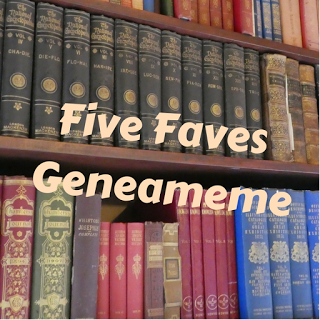
So here, whittled down with great difficulty and in no particular order, are my chosen inspirations:
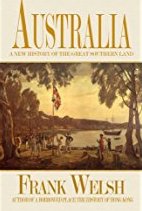 |
Australia: A New History of the Great Southern Land, by Frank Welsh (The Overlook Press, New York, 2006)
Since my books are set very much in the context of early colonial Australia I needed to gen up on my history. This book is not just all-encompassing, it looks at Australia in the context of a larger colonial world. It’s also very readable and has a nice, wry take on historical events, which I really like. |
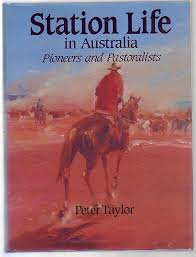 |
Next on the list is Station Life in Australia by Peter Taylor (Allen & Unwin, Sydney, 1988)
Also very readable, with some wonderful anecdotes about the New Chums in early colonial Australia. (The ‘New Chum’ was the Pom who arrived fresh-faced and dewy-eyed and ready to make his fortune on the land without knowing a horse from a heifer; a bit like me.) Essential introduction to a subject I knew nothing about. |
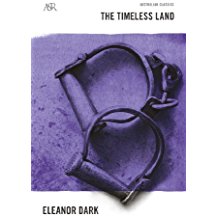 |
Eleanor Dark was doing in the 1940s what other writers such as Kate Grenville don’t dare to do in the 21st century, which is to write about events such as the arrival of the First Fleet from the point of view of Aboriginal people. In fact she writes from the point of view of everyone, from Governor Phillip to convicts and settlers, evenly-handedly and with great perception and understanding. The Timeless Land is book one in a novel trilogy. |

|
Macquarie Country by D G Bowd, (Library of Australian History, 1979)
I had to include this one. It’s about the Hawkesbury – where my ancestors made their first home in New South Wales in 1802 – in the days of Governor Macquarie. It even features my family, who were visited by the governor and his lady wife soon after they arrived in the colony. Full of vivid and useful detail about the earlier days of settlement. |
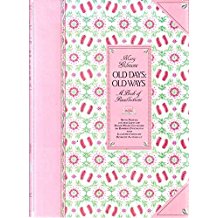
|
In her memoir Old Days, Old Ways (Angus & Robertson, Sydney, 1934) Mary Gilmore was actually writing about her childhood in the Riverina district in the latter part of the 19th century, where she was brought up. The book is a cornucopia of intricate and sometimes hilarious social history; such as the rope that was strung across the room during the Wagga Wagga Gold Cup ball in order to segregate the ‘grandees’ from the ‘commonage’; and the way in which ladies riding horses in crinolines wore weights in their hems in order that their ankles should remain hidden from the gentlemen. Like Eleanor Dark she writes with great humanity and understanding and, crucially, humour. |
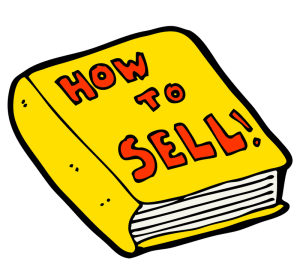
Yesterday evening ALLi (Alliance of Independent Authors) organised a very enlightening meeting with film director and writer Charles Harris on the thorny topic of how to sell your story.
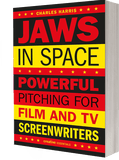
He was referring specifically to the film industry of course, where busy producers expect writers looking for a commission to grab their attention in one sentence, or preferably one phrase, as in ‘Jaws in Space’, which is apparently how the writers sold the idea of the film that turned into Alien, and the title of Harris’ latest book.
Of course if you are an author, and specifically an indie, you will not necessarily be verbally pitching a story in order to get a commission. But what you will be doing is trying to grab readers’ attentions on online retail sites like Amazon, so the same principle applies to your blurb.
In my family history workshops I encourage participants to write a blurb for their book there and then, and then to read them out to the rest of us for our comments: did those few sentences make you want to read the book?
It’s fiendishly hard as we all know. But there’s another thing: if like me you get some way into your story and think to yourself why did I start to write this book in the first place? it helps if at some point you have already written down the answer, in other words what it was that fired you up in the first place, which is to say, the blurb. The blurb can change, it undoubtedly will, and that doesn’t matter. But as Charles mentioned last night for all writers when it comes to pitching an idea, the most important person you should be targetting is yourself.
It can also be a useful unblocker, when you feel yourself grinding to a halt, to take a break and write down, in no more than three sentences, the essence of the story you found so exciting all that time ago.
Thanks to Charles Harris for the talk, to Helena Halme for organising it, and to Waterstone’s Piccadilly for providing the premises (and a few bottles of wine).
If you are interesting in attending meetings like this then it’s worth joining ALLi (click on the logo on the right).
Patsy Trench, London
November 2016
There’s a certain amount of pressure on indie authors these days to churn out several books a year. (Never mind the quality, feel the width.) If you believe some of the hype coming usually from the US there are self published writers out there earning zillions, because they’re writing a dozen books a year, in series, therefore building a ‘platform’ and a loyal readership.
There is sense in this, though for many of us the words ‘platform’ and ‘entrepreneur’ – another favourite – fill us with fear and trembing. Most indie authors don’t make much money, or expect to. We write because we want to write, because, perhaps, we are vain enough to think other people might be prepared to devote a few hours to reading what we have to say. No matter how shy you might be it is true to say you’ve got be quite arrogant to be a writer.
NaNoWriMo – National Novel Writing Month – began a few years ago, in the US of course. The idea is you register on the website and over the 30 days of November you churn out 50,000 words – which is not quite a novel but is quite an achievement. It works out at just under 2,000 words a day.
I’d known about NaNoWriMo for a while but thought it was nothing more than a gimmick with an ugly name. But this year, it being November and not a lot going on, I thought I’d give it a go. We’re only a week in but here’s what I’ve discovered so far:
I am all of these things. That’s partly why it took me six years to write my first book (The Worst Country in the World – though here was a lot of genuine research involved in this) – and a couple of years to write my second (The Unlikely Adventures of Claudia Faraday, absolutely no excuses there). The novel I’m embarking on as part of NaNoWriMo features a character in my last book, as it happens, which makes it part of a series as it happens. But I have absolutely no idea how my story is going to proceed, I have no plan, every day I’m starting out with an empty screen and a blank mind.
Knowing you’re expected to produce all those words, every day of the week, is liberating. It liberates you from going over and over that difficult passage that quite likely will be jettisoned from the final draft of your book anyway. It frees you from having to research every item, moment in history or, in my case, actual person, and then finding it impossible not to include everything you’ve learned just to show off. It frees you from dithering – shall we switch to a passionate romance in the South of France in the next chapter or shall we stage a momentous marital row leading to divorce? – stalled by thinking the decision you make is crucial, and irrevocable.
Whether or not you, or I, end up with any kind of a product at the end of the month isn’t really the point. What is exciting about writing is discovery. You wake up in the morning without an idea in your head and a couple of hours later, there you are with a brand new character doing stuff you never dreamed you would dream up in a million years. It’s childish in some ways, in the best ways, playing with your imagination and seeing where it will take you. Writing through (is it through or by?) the seat of your pants as the expression goes may not suit every writer. But I would actually recommend it, even to the meticulous planners, if only as an experiment. You might surprise yourself. Which is ultimately what writing is all about.
He was a real person from several centuries ago: an estate manager who fell in love with and married the boss’ daughter, resulting in her disinheritance from the family fortune. She couldn’t figure out what he looked like, how he spoke, walked, and so on. So I asked her when she sells the film rights to this as-yet-unwritten masterpiece, who she would cast in the role, which set us off into a flurry of googling thirty-/forty-something actors who could play both tough and tender, with a bit of the Four Musketeers thrown in.
My first suggestion, Tom Hiddleston, was rejected because he looked too ‘nice’, though I tried in vain to explain to my friend that his Coriolanus was far from ‘nice’. (That was just as well as I rather fancied him to play George Matcham, the tall, rich and elegant gentleman who appeared in my book.)

That got me thinking about who might play Claudia in my as-yet-to-be-published novel The Unlikely Adventures of … People from Glenda Jackson on complain still about the lack of parts for mature actresses, but I struggled to think of a suitable one. Vanessa Redgrave (a tad too old), Maggie Smith (too mannered), Judi Dench (perfect, if she was younger), Charlotte Rampling (at a pinch). I ended up eventually with Penelope Wilton.

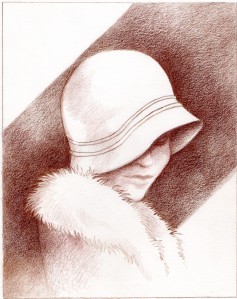
This is not just a fun game, it’s a useful exercise for writers. If you can see your character, hear what she/he sounds like, it might just help to create him or her in the first place.